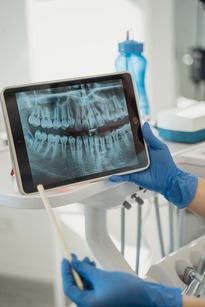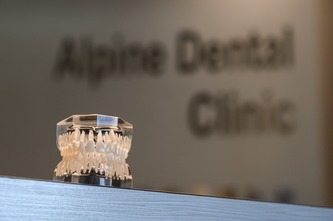Teeth Grinding (Bruxism)
Teeth Grinding Treatment in Swift Current
Teeth grinding, also known as bruxism, is a common condition that affects many people, often without them realizing it. Characterized by clenching or grinding the teeth, bruxism can occur during the day or while sleeping and can lead to a range of oral health issues. At Alpine Dental Clinic, we specialize in diagnosing and treating bruxism to help protect your teeth and improve your overall well-being.
What Is Bruxism?
Bruxism is the involuntary clenching or grinding of teeth. It is often categorized into two types:
- Awake Bruxism: This occurs during the day and is usually related to stress or concentration.
- Sleep Bruxism: This happens while sleeping and is considered a sleep-related movement disorder.
Although occasional teeth grinding may not cause harm, chronic bruxism can lead to significant dental and overall health problems.
What Causes Teeth Grinding?
Bruxism can be triggered by various factors, including:
- Stress and Anxiety: Emotional stress is one of the most common causes of teeth grinding.
- Sleep Disorders: Conditions such as sleep apnea and snoring are often linked to sleep bruxism.
- Malocclusion: Misaligned teeth or an uneven bite can contribute to grinding.
- Lifestyle Habits: Excessive caffeine or alcohol consumption can exacerbate teeth grinding.
- Medications: Certain medications, particularly antidepressants, may increase the likelihood of bruxism.
- Personality Traits: Highly competitive or hyperactive individuals may be more prone to this condition.
Signs and Symptoms of Bruxism
Bruxism can be difficult to detect, especially if it occurs while sleeping. However, some common signs and symptoms include:
- Worn, flattened, or chipped teeth
- Tooth sensitivity or pain
- Jaw pain or tightness
- Headaches, especially in the morning
- Earaches without an ear infection
- Damage to the inside of the cheeks from chewing
- Disrupted sleep for yourself or your partner (due to grinding noises)
Why Is Treating Bruxism Important?
Untreated bruxism can lead to serious dental and health complications, such as:
- Tooth Damage: Grinding can wear down enamel, leading to tooth fractures or loss.
- Jaw Disorders: Bruxism can contribute to temporomandibular joint (TMJ) disorders, causing jaw pain and difficulty chewing.
- Gum Recession: Excessive grinding can damage gum tissue, leading to sensitivity and an increased risk of gum disease.
- Sleep Disruption: Chronic grinding can negatively affect sleep quality for you and those around you.

How Is Bruxism Diagnosed?
At Alpine Dental Clinic, our experienced dentists can identify signs of bruxism during a routine dental exam. We look for evidence of tooth wear, jaw issues, and other symptoms that may indicate grinding or clenching.
If you suspect you may have bruxism, we encourage you to schedule an appointment so we can evaluate your symptoms and discuss treatment options tailored to your needs.
Treatment Options for Bruxism
There are several effective ways to manage and treat bruxism:
1. Custom Nightguards
One of the most common and effective treatments for bruxism is a custom-fitted nightguard. These devices protect your teeth by providing a barrier between the upper and lower teeth, reducing the impact of grinding and clenching.
At Alpine Dental Clinic, we create high-quality, custom nightguards designed for your comfort and specific needs.
2. Stress Management
Since stress is a major trigger for bruxism, learning relaxation techniques such as meditation, yoga, or counseling can help reduce the severity of grinding.
3. Dental Corrections
If misaligned teeth or an uneven bite are contributing factors, orthodontic treatments or restorative procedures may be recommended to correct the issue.
4. Medication
In some cases, muscle relaxants or medications may be prescribed to help manage bruxism, particularly if it’s linked to a sleep disorder or high stress levels.
5. Behavioral Therapies
Awake bruxism can often be managed with behavioral therapies to train yourself to stop clenching or grinding during the day.
6. Lifestyle Changes
Limiting caffeine and alcohol, avoiding chewing on non-food items (like pens), and maintaining good sleep hygiene can all help reduce bruxism.
Why Choose Alpine Dental Clinic for Bruxism Treatment?
At Alpine Dental Clinic, we understand the impact that bruxism can have on your oral health and quality of life. Our skilled team is dedicated to providing personalized treatment options to address the root cause of your teeth grinding and protect your smile.
We offer:
-
- Comprehensive evaluations to identify the signs of bruxism.
- Custom-fitted nightguards for optimal comfort and protection.
- Expert advice on lifestyle changes and stress management techniques.
- Advanced dental solutions to address bite issues and restore damaged teeth.

Teeth grinding, or bruxism, is a common condition that can lead to serious dental and health issues if left untreated. With proper diagnosis and treatment, it’s possible to manage bruxism effectively and protect your smile for years to come.
If you’re experiencing symptoms of bruxism or have concerns about teeth grinding, schedule an appointment with Alpine Dental Clinic today. Let us help you find the best solution to maintain your oral health and overall well-being. Visit Alpine Dental Clinic to learn more about our services and take the first step toward a healthier, pain-free smile.



 Monday – Friday 8AM – 4PM
Monday – Friday 8AM – 4PM

